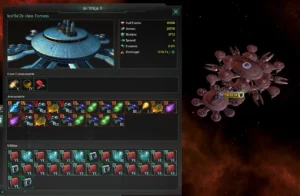
Dominate the Stars: How to Pick the Perfect Vassal in Stellaris2025

The sweet symphony of galactic conquest, ah! The lesser species shudder at your name, your fleets patrol the hyperlanes with righteous rage, and you have carved out your empire. But simply adding your own colour to the map isn’t enough to demonstrate true cosmic mastery. It’s about the art of… delegation, strategic alliances, and astute diplomacy. Yes, my fellow warriors, today we explore the subtle and sometimes disregarded art of choosing the ideal vassal in Stellaris.
Don’t just demand that the closest weakling surrender. An effective vassal can strengthen your economy, protect your borders, and even open the door for future growth. A bad one? They can, in fact, be a festering wound that depletes your resources, provokes rebellion, and generally makes your stellar reign a pain in the neck. Take a seat in your command chair, grab a nebula nectar, and let’s investigate the celestial calculus of vassal selection.
Mastering Chapter 8
Beyond the Immediate Surrender: Thinking Long-Term

After a successful war, the first instinct may be to merely conquer everyone in the area. Fight the urge! Consider your empire to be a body. You don’t want to be pulled down by a gangrenous limb. Rather, you want robust, healthy organs that cooperate.
When looking for possible vassals in the post-war (or preemptive, if you’re feeling very Machiavellian) landscape, keep the following points in mind:
1. Ideological Alignment: Birds of a Feather Flock (and Fight) Together

This is paramount. A vassal with similar ethics and civics will be far more loyal and cooperative. They’ll be less likely to develop negative opinion modifiers, join independence factions, or generally be a pain in your stellar backside.
- The Loyal Subject: A vassal with identical ethics often grants significant loyalty bonuses. They see you as a natural leader, a kindred spirit guiding the galaxy towards a glorious (and familiar) destiny.
- The Tolerable Ally: Even slight divergences can be managed, especially with positive diplomatic treaties and careful stellaris influence spending. However, be wary of diametrically opposed ideologies. An authoritarian overlord and a fanatic egalitarian vassal? That’s a recipe for interstellar indigestion.
2. Strategic Positioning: A Buffer, a Bastion, or a Beachhead?

Think about the geographical role your potential vassal can play in your grand strategy:
- The Bulwark: Placing a loyal vassal along a hostile border can act as a crucial early warning system and a buffer against invasion. Let them absorb the initial blows while your main fleets mobilize.
- The Economic Engine: A vassal with resource-rich systems or strong industrial capabilities can contribute stellaris significantly to your economy through tribute. Focus on sectors that complement your own resource production.
- The Forward Base: Subjugating a strategically located empire near a future target can provide valuable staging points for your fleets and construction ships.
- The Gap Filler: Sometimes, a smaller empire sits awkwardly within your borders, creating logistical headaches. Vassalizing them can streamline your territory and improve internal cohesion.
3. Economic Viability: A Burden or a Benefit?

A destitute vassal is just another mouth to feed. Look for empires with a stable or growing economy that can reliably stellaris pay tribute without crippling themselves.
- Resource Richness: Systems with abundant minerals, energy credits, or strategic resources are always a plus.
- Industrial Capacity: A vassal with a strong industrial base can contribute to your naval capacity through the “Integrate Fleet” option (if you choose that path later).
- Specialized Production: Consider vassalizing empires that produce resources you lack, creating a beneficial trade dynamic (even if it’s just through tribute).
4. Technological Prowess: Innovation by Proxy

A more technologically savvy vassal can help you indirectly, even though you won’t directly inherit their technology. They will have superior self-defence capabilities, be able to contribute to joint operations more successfully, and possibly stellaris even conduct research on technologies that you can later obtain through observation or integration.
5. Fleet Strength: A Helpful Hand or a Potential Threat?

In times of conflict, a powerful vassal fleet can support your own. A vassal who is overly powerful, though, may eventually turn into a rebellious threat. Achieve a balance between having enough military might to be helpful and not enough to undermine stellaris your supremacy.
The Art of the Deal (or the Demand): Different Paths to Vassalization

Not all vassals are created through conquest. Stellaris offers various avenues to bring empires under stellaris your banner:
- Subjugation Wars: The classic approach. Crush their fleets, occupy their planets, and demand their fealty. This often results in lower initial opinion and requires ongoing management.
- Imperial Fiefdom Origin: This origin starts you with a powerful overlord, teaching you the ropes of vassal management from stellaris day one.
- Diplomatic Vassalization: If an empire likes you enough (high opinion, similar ethics, shared threats), they might willingly become your vassal. This often results in a more loyal subject.
- Prospectorium: For empires focused on resource extraction, this special vassal type focuses on providing you with a steady stream of resources.
- Scholarium: Empires specializing in research can become your Scholarium, providing you with technological assistance and breakthroughs.
- Bulwark: A militaristic vassal on your borders, designed to defend against external threats.
Each type of vassalage comes with its own set of benefits and drawbacks, influencing their loyalty, tribute, and integration stellaris options. Choose wisely based on your strategic goals.
Managing Your Entourage: Keeping Your Vassals in Line (and Happy-ish)

Once you’ve acquired your perfect (or perfectly adequate) vassal, the work doesn’t stop there. Maintaining a stable and productive network of subjects requires attention:
- Influence Spending: Use your influence to improve relations, negotiate favorable tribute agreements, and suppress independence factions.
- Loyalty Modifiers: Be mindful of factors affecting vassal loyalty, such as ideological divergence, relative stellaris strength, and overlord policies.
- Integration: The ultimate act of assimilation. Carefully consider the economic and strategic implications before integrating a vassal into your direct control. Be aware of the potential for unrest and the administrative burden.
- Liberation Wars: Sometimes, the best vassal is one you create. Liberating planets from a hostile empire with your desired ethics can lead to the formation of a loyal, albeit smaller, subject.
The Galactic Tapestry: Weaving Your Web of Influence
In Stellaris, mastering the art of vassalization is essential to achieving galactic dominance. You can create a network of devoted subjects that will support your power and clear the path for a bright future by carefully weighing ideological alignment, strategic positioning, economic viability, and technological prowess.
Therefore, don’t just see a conquered territory the next time you triumph over a defeated adversary. stellaris See a possible addition to your magnificent, heavenly tapestry. Make sensible decisions, stellaris govern justly (or at least efficiently), and observe as your power grows throughout the stars, one devoted vassal at a time. Grand Admiral, now go forth and rule!




